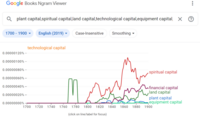spiritual capital(霊的資本)という日本人には耳慣れない用語が、来月の分科会用に私が用意した教皇メッセージ対訳資料4頁目に出てきた。調べてみた。メモしておく。
1st finding:近代資本主義揺籃期、霊的資本(spiritual capital)は最重要資本だったのかもしれない。
近代資本主義(modern capitalism)という用語の初出をGoogle Ngramで調べると、1797年、18世紀最終盤であることが分かる。つまり19世紀の百年間が近代資本主義揺籃期。この百年間、1800年から1900年の間、文献が各種資本を引用する頻度を調べてみる(下図)と、霊的資本(spiritual capital)が金融資本(financial capital)を抑えて最頻で言及されていたことが分かる。なお、期間を1900年から2019年にして調べると、21世紀現在の最頻引用資本は金融資本だが、霊的資本も二番目の頻度で言及されていることが分かる。また近年は、社会資本(social capital)と人的資本(human capital)という新たな資本も生まれ、それらを含めて調べるとこの二種類の資本が現在では最重要視されているが、それでも霊的資本は金融資本の次の頻度、即ち頻度四位で言及されていることが分かる。
1900年から2019年の間、社会資本(social capital)と人的資本(human capital)という新たな資本と金融資本(financial capital)を除いて調べてみると、21世紀に入って霊的資本の引用頻度が急激に上がっていることが分かる。その理由は以下の様に推察されている。
2nd finding:Spiritual capital has come to prominence in recent years due to the combination of three related trends: the failure of secularization/modernization theories to account for reality; a rise in religiosity globally; and, the lack of ethics and virtue evidenced in the financial crisis and an ongoing plague of corporate scandals.
(出典:左掲書籍第24章論文「Spiritual Capital」Abstract)
半訳:霊的資本(spiritual capital)は近年、関連する次の三つの傾向が組み合わさったために、卓越して注目を集めるようになっている。 「世俗化理論または近代化理論ではrealityを説明しきれなくなった」「世界的な宗教性の興隆」「金融危機、および現在も続いている複数のcorporate不祥事で証明される、ethics(倫理)とvirtue(美徳)の欠如」。
3rd finding:霊的資本(spiritual capital)の現在での定義の例。
The notion of “spiritual capital” has been the subject of growing interest in recent years; however, the concept remains poorly defined. Based on a review of the academic literature and on interviews and focus groups conducted with leaders and volunteers of over fifteen NGOs and community groups in Hong Kong, Macau and Taiwan, this paper proposes a preliminary conceptual framework for understanding, generating and applying spiritual capital. We discuss the problematic aspects of the concept and its potential for offering a critical, engaged perspective on the social relations of capital and identifying the means for transforming them through the application of spiritual motivations and values. We define spiritual capital as “the individual and collective capacities generated through affirming and nurturing people as having intrinsic spiritual value”. In contrast to some other definitions and theorizations of spiritual capital, this conceptual framework stresses (1) that spiritual capital is an autonomous form of value which is not merely a subset of social, cultural or religious capital; (2) that spiritual capital is based on the affirmation of intrinsic value and, as such, offers a critical perspective on instrumental concepts of capital and its conversion; (3) that spiritual capital generates and transforms social and material relations. Spiritual capital is generated through the affirmation and nurturing of each human being as having intrinsic, infinite spiritual value. When this affirmation and nurturing are built into the organizational culture of a third sector organization, it enhances individual and group capacity to pursue intrinsic goals and serve the common good.
(出典:Clarifying the Concept of Spiritual Capital – Abstract, David Alexander Palmer)
半訳:「霊的資本」概念は近年、日増しに関心を集める対象であり続けている。しかしながら、この概念は未だにほとんど定義づけられていない。本論文では、香港、マカオ、台湾の15団体以上のNGOsとcommunity groupsの、leaders and volunteersが集まって2013年7月に開催された「宗教に関する社会科学研究会議」での集中討議、および諸インタビューと学術文献に基づいて、霊的資本の適用・生成・理解のための予備概念的枠組みを提案する。ここにおいて私達は、この概念の未だ問題含みの側面と、各種資本を社会的に関係づける上で不可欠な実視野を提供する潜在力とを考察し、霊的価値観と諸々の霊的動機を実際に適用する際に用いられる、霊的資本変革方法を同定した。私達は霊的資本を「peopleを、本質的に固有な霊的価値を持つものとして肯定・養成することで創出されるthe individual and collective capacities(個人的・集団的潜在能力)」と定義する。他にも色々ある霊的資本の定義づけ・理論づけと異なり、この概念枠組みは以下の点を強調する。『(1)霊的資本は或る一つの自律的形態を持つ価値であって、他の社会資本・文化資本・宗教資本の単なる部分集合ではない。(2)霊的資本は、本質的に固有な価値の肯定に基づくものであって、そうであるからこそ、諸々の資本概念が有する器機性とその収束に関してとても重要な視野を提供する。(3)霊的資本は、社会と物財との諸関係を創出・変革する。』 霊的資本は、each human beingを、本質的に固有で無限の霊的価値を持つものとして肯定・養成することで創出される。例えばこのような肯定・養成が、或る第三セクター有機組織の、有機組織的文化の中に構築されるならば、本質的に固有なゴールの追求と共通善への奉仕に関する、個人的団体的潜在能力は強化される。


